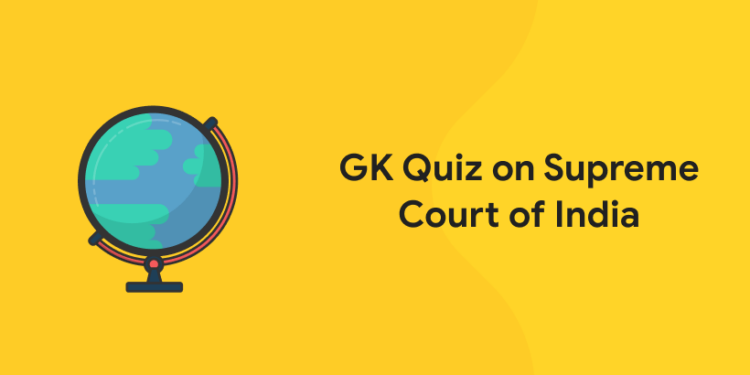The functions of the Supreme Court of India is an unavoidable topic for all competitive examinations. So, candidates can check the detailed information about the Supreme court of India, and here aspirants can practice GK Quiz on the Supreme Court of India.
Supreme Court of India- Power, Functions
GK QUIZ ON SUPREME COURT OF INDIA
1)Where did India get its concept of single order of court?
- Govt of India act,1935.
- Govt of India act,1919.
- Pitt’s India act,1773.
- None of the above.
Answer : a. Govt of India act,1935.
2) Which of the following statements is not true about India’s supreme court?
- Article 124 to 147 and part v of the Indian constitution informs about the composition and power of the Supreme Court.
- The Supreme Court was inaugurated on Jan 28,1950.
- The first female CJI was from Karnataka.
- Judges of the supreme court are appointed by the president of India.
Answer : c. The first female CJI was from Karnataka.
3) Which of the following is not included in the qualification for being a judge in the supreme court?
- He/she should be a citizen of India.
- He should be a respected Jurist in the eyes of parliament.
- He/she must be a Judge in the High Court for at least 5 years.
- He/she should be a lawyer in the High Court for at least 10 years.
Answer : b. He should be a respected Jurist in the eyes of parliament.
Explanation: As per the statement in the Constitution, the volunteer of the Judge must be a respected Jurist in the eyes of the President and not the Parliament.
4) Who can remove the Judge of the Supreme Court?
- Only the President.
- Both parliament and President.
- Only the Parliament.
- Chief Justice of the Supreme Court.
Answer : b. Both Parliament and President.
Explanation: The proposal for the removal of the judge should be passed with a special majority in both the Houses of Parliament, while the decision to remove from the post is taken by the President.
5) The President can declare a judge an executive chief justice of the Supreme Court of India when..?
- The Chief Justice of India is temporarily absent.
- The post of Chief Justice of India is vacant.
- The Chief Justice of India is unable to discharge his obligations.
- All of the above.
Answer : d. All of the above.
Explanation: The President can declare an executive CJI when the current Chief Justice of India is not available, or if the post is vacant or if he/she is unable to discharge his/her duties.
6) Which statement is NOT correct regarding the tenure of judges of the Supreme Court?
- A judge of the Supreme Court can remain in office till the age of 65 years.
- A Supreme Court judge can be removed only in the condition of misconduct.
- On the recommendation of Parliament, he can be removed by the President.
- A Judge of the Supreme Court gives his resignation letter to the Chief Justice.
Answer : d. A Judge of the Supreme Court gives his resignation letter to the Chief Justice.
Explanation: A judge of the Supreme Court gives his resignation letter to the President.
7) What is the current salary of the Chief Justice of the Supreme Court?
- 1.10 lakh P/M.
- 1 lakh P/M.
- 2.8 lakh P/M.
- 1.25 lakh P/M.
Answer : c. 2.8 lakh P/M.
Explanation: The salary of the Chief Justice of India was increased to Rs. 2,80,000/month from 1 lakh. Other Judges of the Supreme Court get a salary of Rs. 2.5 lakhs.
8) Which of the following is not matched correctly?
- Article 145 : salary of Judges.
- Article 144 : power of President to consult with the Supreme Court.
- Article 141 : orders of the Supreme Court are applicable to all Courts of India.
- Article 139 : power of Supreme Court to issue writ petition.
Answer : a. Article 145 : salary of Judges.
Explanation: Article 145 is related to rules of the Supreme Court not the salary of Judges.
9) Who among the following has the right to establish the bench of the Supreme Court elsewhere in the country?
- The Chief Justice of the Supreme Court.
- The President of India.
- The Parliament.
- The Prime Minister.
Answer : a. The Chief Justice of the Supreme Court.
Explanation: The Chief Justice of the Supreme Court has the right to establish the bench of the Supreme Court elsewhere in the country with prior approval of the President.
10) Which of the following articles states about the establishment of the Supreme Court ?
- Article 176.
- Article 153.
- Article 124.
- Article 324.
Answer : c. Article 124.
Explanation: There shall be a Supreme Court of India constituting of a Chief Justice of India and, until parliament by law prescribes a larger number, of not more than seven other Judges.
Attempt free Aptitude Mock Tests! Download Entri App!
So, this was a short quiz based on the Supreme Court of India. Hope this will have helped you with the exam preparations.
Download Entri App to practice and learn daily and monthly current affairs, GK quizzes, Daily rank-booster, and current affairs quiz sections. Practice mock tests to ace your preparations.













